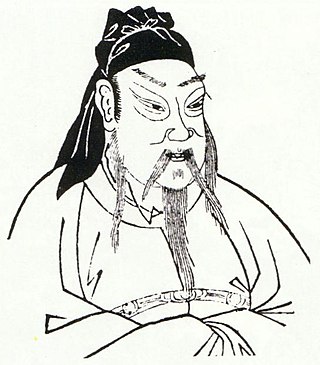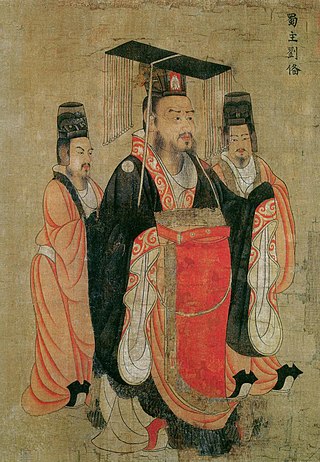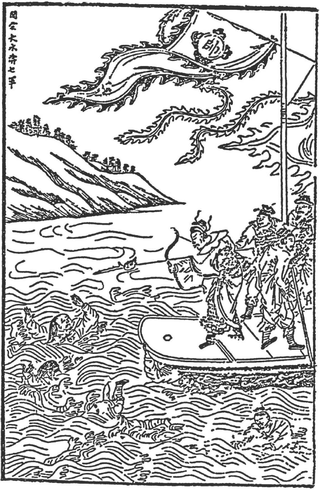
Guan Yu, courtesy name Yunchang, was a Chinese military general serving under the warlord Liu Bei during the late Eastern Han dynasty of China. Along with Zhang Fei, he shared a brotherly relationship with Liu Bei and accompanied him on most of his early exploits. Guan Yu played a significant role in the events leading up to the end of the Han dynasty and the establishment of Liu Bei's state of Shu Han during the Three Kingdoms period. While he is remembered for his loyalty towards Liu Bei, he is also known for repaying Cao Cao's kindness by slaying Yan Liang, a general under Cao Cao's rival Yuan Shao, at the Battle of Boma. After Liu Bei gained control of Yi Province in 214, Guan Yu remained in Jing Province to govern and defend the area for about seven years. In 219, while he was away fighting Cao Cao's forces at the Battle of Fancheng, Liu Bei's ally Sun Quan broke the Sun–Liu alliance and sent his general Lü Meng to conquer Liu Bei's territories in Jing Province. By the time Guan Yu learned about the loss of Jing Province after his defeat at Fancheng, it was too late. He was subsequently captured in an ambush by Sun Quan's forces and executed at Linju, Xiangyang Commandery.

The Battle of Xiaoting (猇亭之戰), also known as the Battle of Yiling and the Battle of Yiling and Xiaoting, was fought between the state of Shu and the state of Wu, between the years 221 and 222 in the early Three Kingdoms period of China. The battle is significant because Wu was able to turn the situation from a series of initial losses into a defensive stalemate, before proceeding to win a decisive victory over Shu. The Wu victory halted the Shu invasion and preceded the death of Liu Bei, Shu's founding emperor.

Liu Bei, courtesy name Xuande (玄德), was a Chinese warlord in the late Eastern Han dynasty who later became the founding emperor of Shu Han, one of the Three Kingdoms of China.

Lü Meng, courtesy name Ziming, was a Chinese military general and politician who served under the warlord Sun Quan during the late Eastern Han dynasty of China. Early in his career, he fought in several battles under the banner of Sun Ce, Sun Quan's elder brother and predecessor. Although he had been noted for his bravery, he was still deemed as nothing more than a "mere warrior" for his lack of literacy skills. Later, with encouragement from Sun Quan, Lü Meng took up scholarly pursuits to improve himself, gradually becoming a learned and competent military leader. In 217, he succeeded Lu Su as the frontline commander of Sun Quan's forces in Jing Province. Two years later, in a carefully calculated military operation, Lü Meng led an invasion of Liu Bei's territories in southern Jing Province, swiftly and stealthily capturing all the lands from Liu Bei's general Guan Yu, who was captured and executed after his defeat. Lü Meng enjoyed his finest hour after the victory but died a few months later because he was already seriously ill before the campaign.

Gan Ning, courtesy name Xingba, was a Chinese military general serving under the warlord Sun Quan in the late Eastern Han dynasty. Originally a notorious pirate, he gave up the life of a marauder in the late 190s and became a subordinate of Huang Zu, the Administrator of a commandery in present-day east-central Hubei. Disheartened by Huang Zu's indifferent attitude towards him, Gan Ning eventually left Huang and made his way into Wu territory, where he found his calling and became a military officer under the warlord Sun Quan. Throughout his years of service under Sun Quan until his death, Gan Ning fought in numerous battles for his lord, including the battles of Jiangxia (208), Red Cliffs (208–209), Xiaoyao Ford (214–215) and Ruxu (217).

Zhou Tai, courtesy name Youping, was a military general serving under the warlord Sun Quan during the late Eastern Han dynasty and early Three Kingdoms period of China. He previously served under Sun Ce, Sun Quan's elder brother and predecessor.

Zhou Yu (175–210), courtesy name Gongjin, was a Chinese military general and strategist serving under the warlord Sun Ce in the late Eastern Han dynasty of China. After Sun Ce died in the year 200, he continued serving under Sun Quan, Sun Ce's younger brother and successor. Zhou Yu is primarily known for his leading role in defeating the numerically superior forces of the northern warlord Cao Cao at the Battle of Red Cliffs in late 208, and again at the Battle of Jiangling in 209. Zhou Yu's victories served as the bedrock of Sun Quan's regime, which in 222 became Eastern Wu, one of the Three Kingdoms. Zhou Yu did not live to see Sun Quan's enthronement, however, as he died at the age of 35 in 210 while preparing to invade Yi Province. According to the Records of the Three Kingdoms, Zhou Yu was described as tall and handsome. He was also referred to as "Master Zhou". However, his popular moniker "Zhou the Beautiful Youth" does not appear in either the Records or the 14th-century historical novel Romance of the Three Kingdoms. Some Japanese writers such as Fumihiko Koide believe that this was a later invention by Japanese storytellers such as Eiji Yoshikawa.

Xu Huang, courtesy name Gongming, was a Chinese military general serving under the warlord Cao Cao in the late Eastern Han dynasty of China. He later served in the state of Cao Wei during the Three Kingdoms period under the first two rulers, Cao Pi and Cao Rui, before his death at the start of Cao Rui's reign. Xu Huang is best noted for breaking the siege at the Battle of Fancheng in 219 by routing the enemy commander Guan Yu on the field.

Zhang Fei, courtesy name Yide (益德), was a Chinese military general and politician serving under the warlord Liu Bei in the late Eastern Han dynasty and early Three Kingdoms period of China. Zhang Fei and Guan Yu, who were among the earliest to join Liu Bei, shared a brotherly relationship with their lord and accompanied him on most of his early exploits. Zhang Fei fought in various battles on Liu Bei's side, including the Red Cliffs campaign (208–209), takeover of Yi Province (212–214), and Hanzhong Campaign (217–218). He was assassinated by his subordinates in 221 after serving for only a few months in the state of Shu Han, which was founded by Liu Bei earlier that year.

Cao Ren, courtesy name Zixiao, was a military general serving during the late Eastern Han dynasty of China under the warlord Cao Cao, who was also his older second cousin. He continued serving in the state of Cao Wei – founded by Cao Cao's son and successor, Cao Pi – during the Three Kingdoms period. He played a significant part in assisting Cao Cao in the civil wars leading to the end of the Han dynasty. He was appointed as the Grand Marshal (大司馬) when Cao Pi ascended the throne, and was also credited by the latter for the establishment of Wei. However, Cao Ren was also once derided as a mediocre commander by Zhu Huan, a general from Wei's rival state Eastern Wu.

Pang De, courtesy name Lingming, was a Chinese military general who lived during the late Eastern Han dynasty. He started his career under the warlord Ma Teng, who was based in Liang Province. In 211, Ma Teng's son Ma Chao, along with a coalition of warlords from Liang Province, started a rebellion against the Han central government, which was controlled by the warlord Cao Cao. After Cao Cao defeated Ma Chao and the coalition at the Battle of Tong Pass, Ma Chao fled to Hanzhong Commandery and took shelter under the warlord Zhang Lu. Pang De accompanied him to Hanzhong. When Ma Chao defected from Zhang Lu's side in order to join the warlord Liu Bei, Pang De remained in Hanzhong and eventually came to serve Cao Cao after Cao Cao defeated Zhang Lu at the Battle of Yangping and took over Hanzhong. In 219, Pang De fought at the Battle of Fancheng under Cao Ren's command against Liu Bei's forces led by Guan Yu. Pang De was captured in battle and eventually executed by Guan Yu when he refused to surrender.
Ling Tong (189–217), courtesy name Gongji, was a Chinese military general serving under the warlord Sun Quan during the late Eastern Han dynasty of China. He started his service under Sun Quan when he was still a teenager and, throughout his entire life, had been contributing to the foundation and solidification of the state of Eastern Wu, which Sun Quan established in 229. He fought in numerous battles for his lord, including those against Huang Zu, Liu Bei and the Shanyue tribes, but is best known for his performance in the campaigns against Sun Quan's archrival Cao Cao, in which he displayed great skill and tact in extremely adverse situations.
Wen Ping, courtesy name Zhongye, was a military general who lived during the late Eastern Han dynasty and Three Kingdoms period of China. During his tenure as a general under the warlord Cao Cao, he was credited with defeating the enemy general Guan Yu and defending Cao Cao's interests in Jiangxia Commandery from the eastern warlord Sun Quan.

The Battle of Fancheng or the Battle of Fan Castle was fought between the warlords Liu Bei and Cao Cao in 219 in the late Eastern Han dynasty. It is named after Fancheng in present-day Xiangyang, Hubei, a fortress that played a significant role in the battle.
The Battle of Yiling was fought between the warlords Sun Quan and Cao Cao in 208 in the late Eastern Han dynasty. The battle was an integral part in the Red Cliffs campaign, as it was fought immediately after the major engagement at Wulin during the Battle of Red Cliffs. The Battle of Yiling was also the prelude to the subsequent Battle of Jiangling.
Pan Zhang, courtesy name Wengui, was a military general serving under the warlord Sun Quan during the late Eastern Han dynasty of China. He continued serving in the state of Eastern Wu during the Three Kingdoms period until his death. Pan Zhang was praised by Chen Shou as one of the "twelve tiger minister of Jiangdong" (江東十二虎臣).

Lü Meng's invasion of Jing Province was fought between the warlords Sun Quan and Liu Bei in the winter of 219–220 in the late Eastern Han dynasty. Sun Quan's forces, led by Lü Meng, invaded Liu Bei's territories in southern Jing Province, which covered present-day Hubei and Hunan. The campaign occurred after the Battle of Fancheng and concluded with victory for Sun Quan's forces, who completely captured all of Liu Bei's territories. Guan Yu, Liu Bei's general guarding those territories, was captured and executed by Sun Quan's forces. The fall of Jing Province and Guan Yu's death provided the trigger for the Battle of Xiaoting between Liu Bei and Sun Quan between 221 and 222.
The Battle of Jiangling was fought between the forces of the Cao Wei and Eastern Wu dynasties in the early Three Kingdoms period of China. The battle, which took place around present-day Jiangling County, Hubei, was an integral part of the Wei emperor Cao Pi's three-pronged campaign against the Wu leader Sun Quan. It spanned a period of about six months from October 222 to April 223. Of the three fronts, the most critical Wei attacks were concentrated against the Wu fortress at Jiangling.
The Sun–Liu territorial dispute was a military conflict between the warlords Sun Quan and Liu Bei in 215 during the late Eastern Han dynasty of China. While Sun Quan and Liu Bei had initially formed an alliance in 208 against their common rival Cao Cao, both sides got into a territorial dispute over the territories in southern Jing Province in the early 210s. The dispute ended when both sides agreed to divide the territories along the Xiang River between their respective domains: Sun Quan took the lands east of the river while Liu Bei kept those west of the river. Despite a peaceful settlement to the territorial dispute, Sun Quan ultimately sent his forces to attack Liu Bei's territories in an invasion in 219 and succeeded in capturing all of them.













